Charles E W Bean, Diaries, AWM38 3DRL 606/247/1 - 1917 - 1933 - Part 18
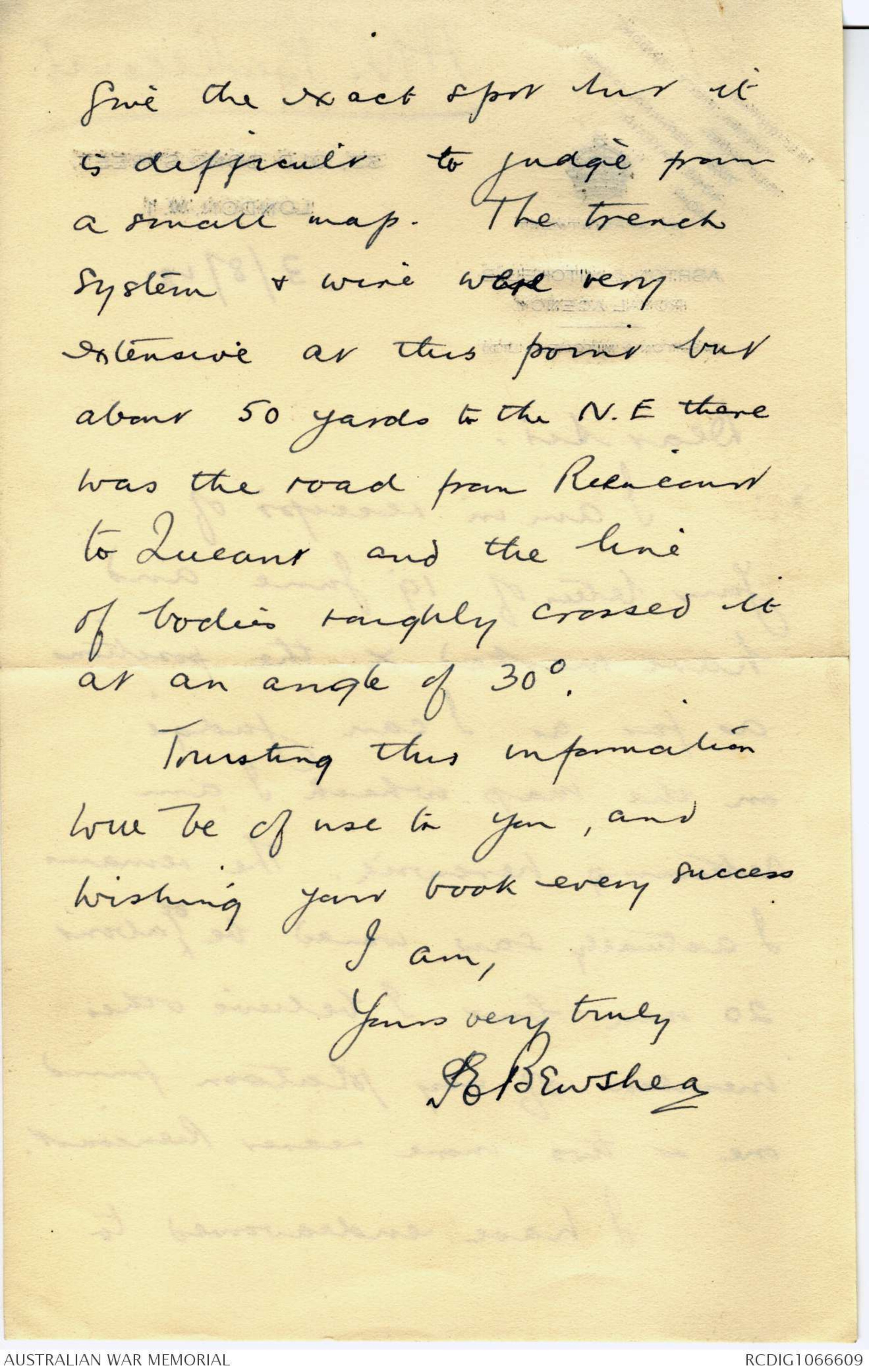
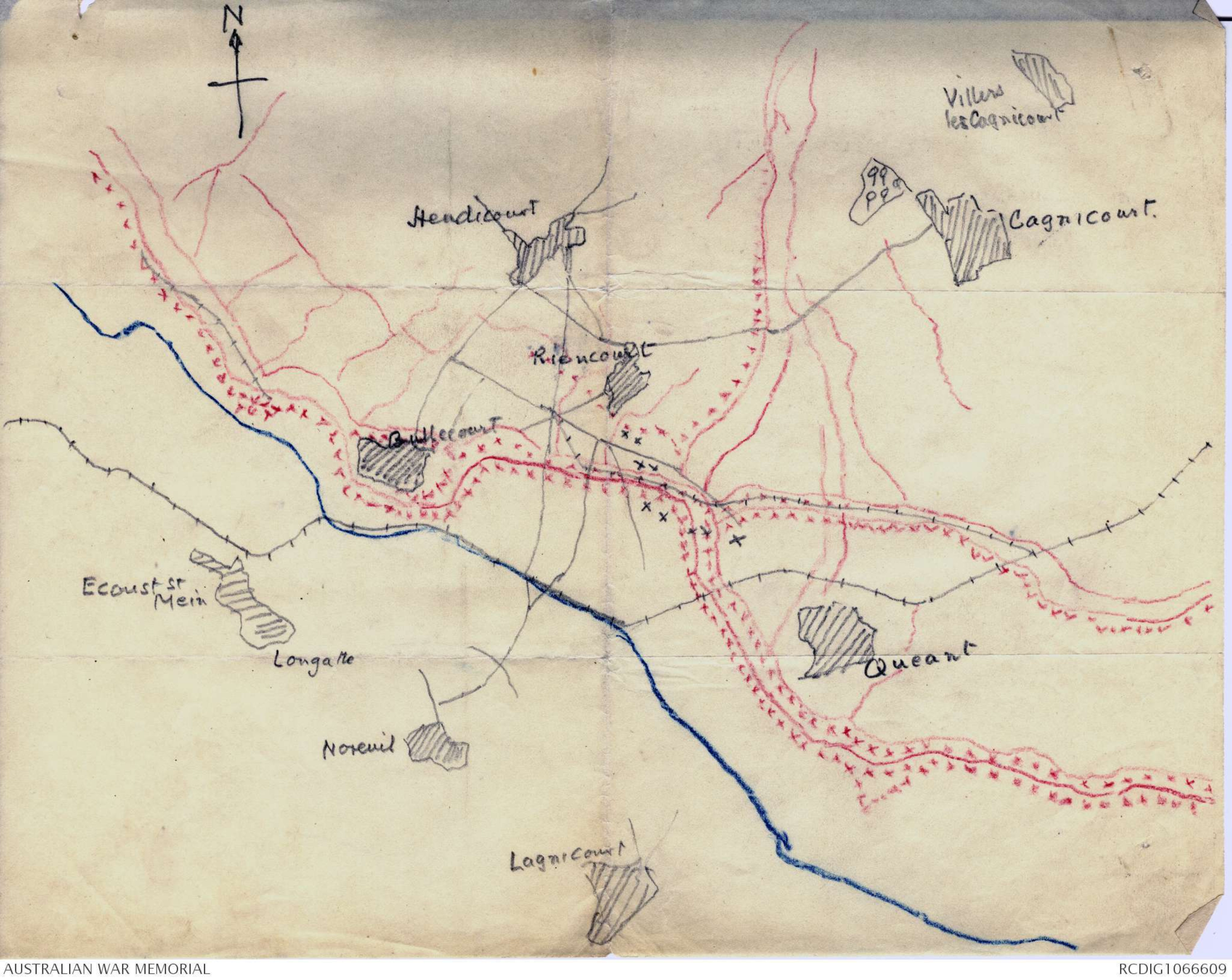
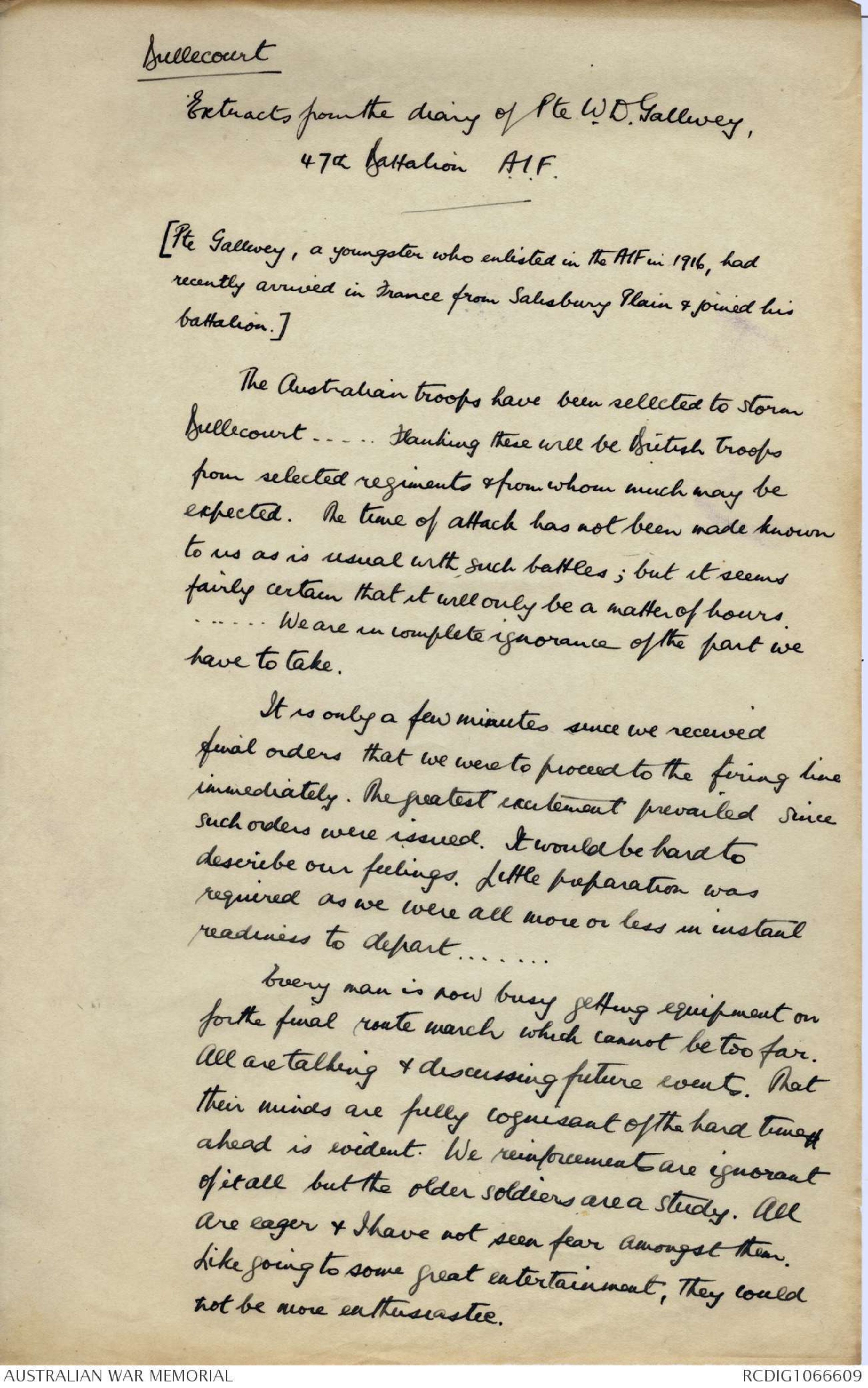
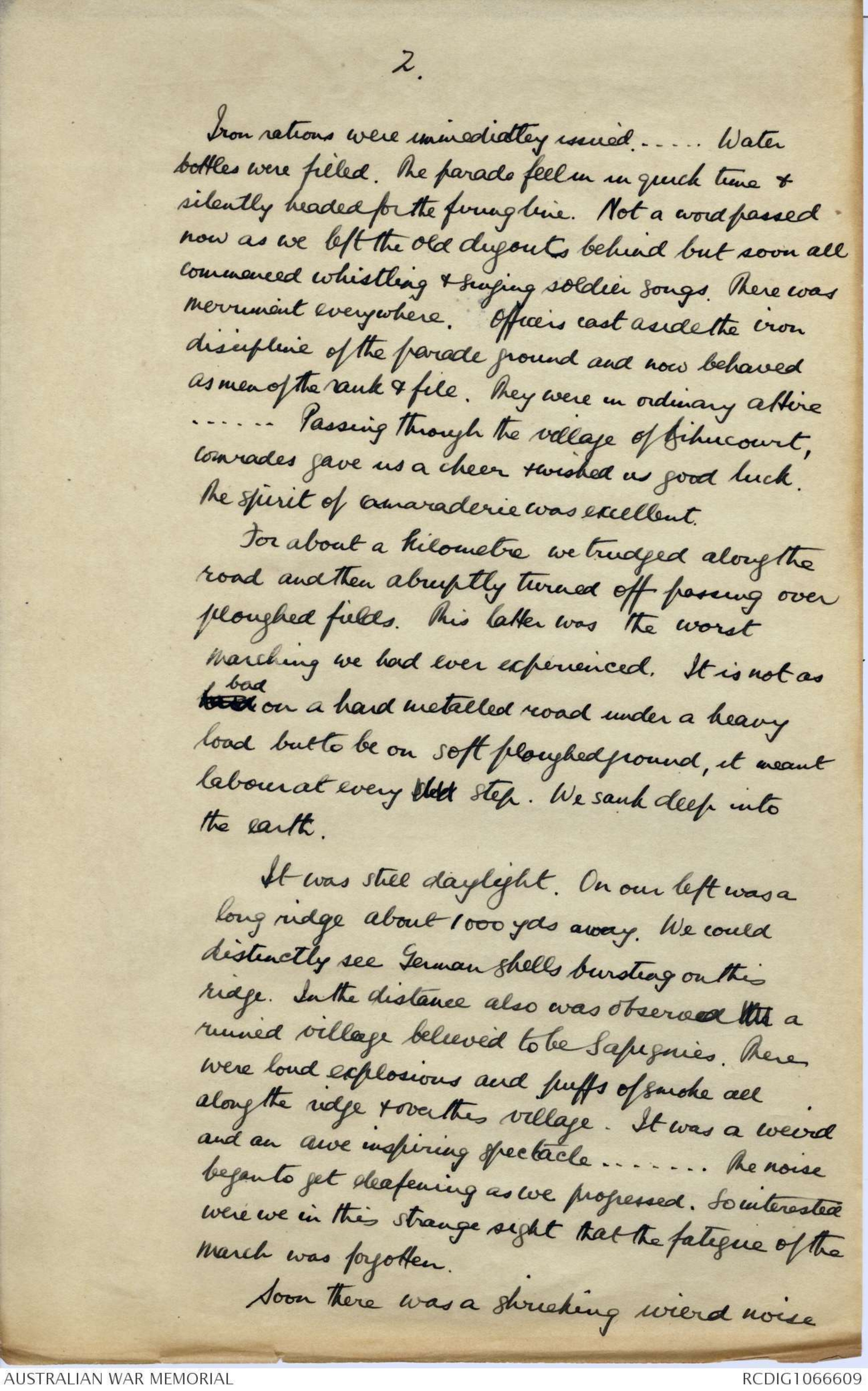
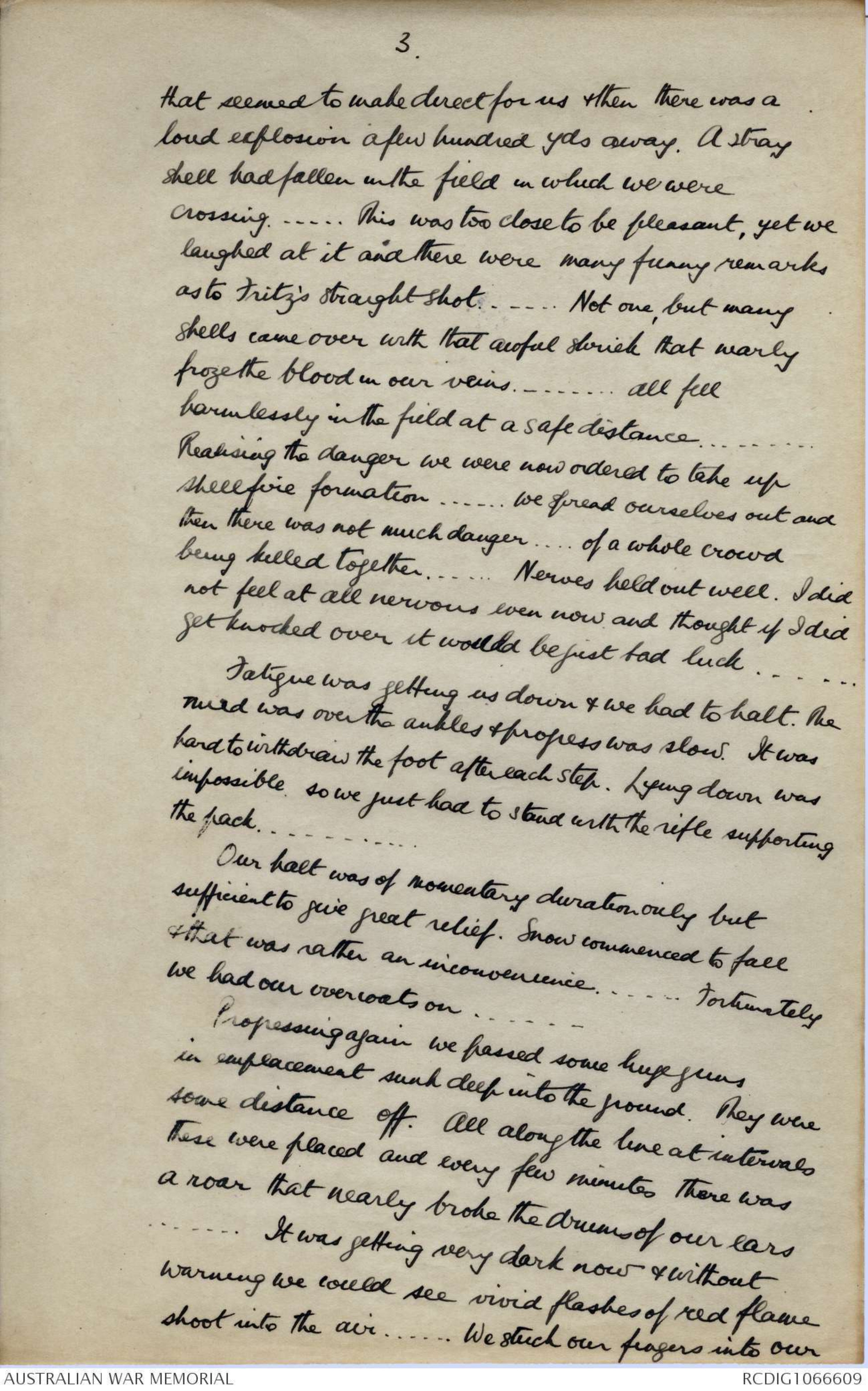
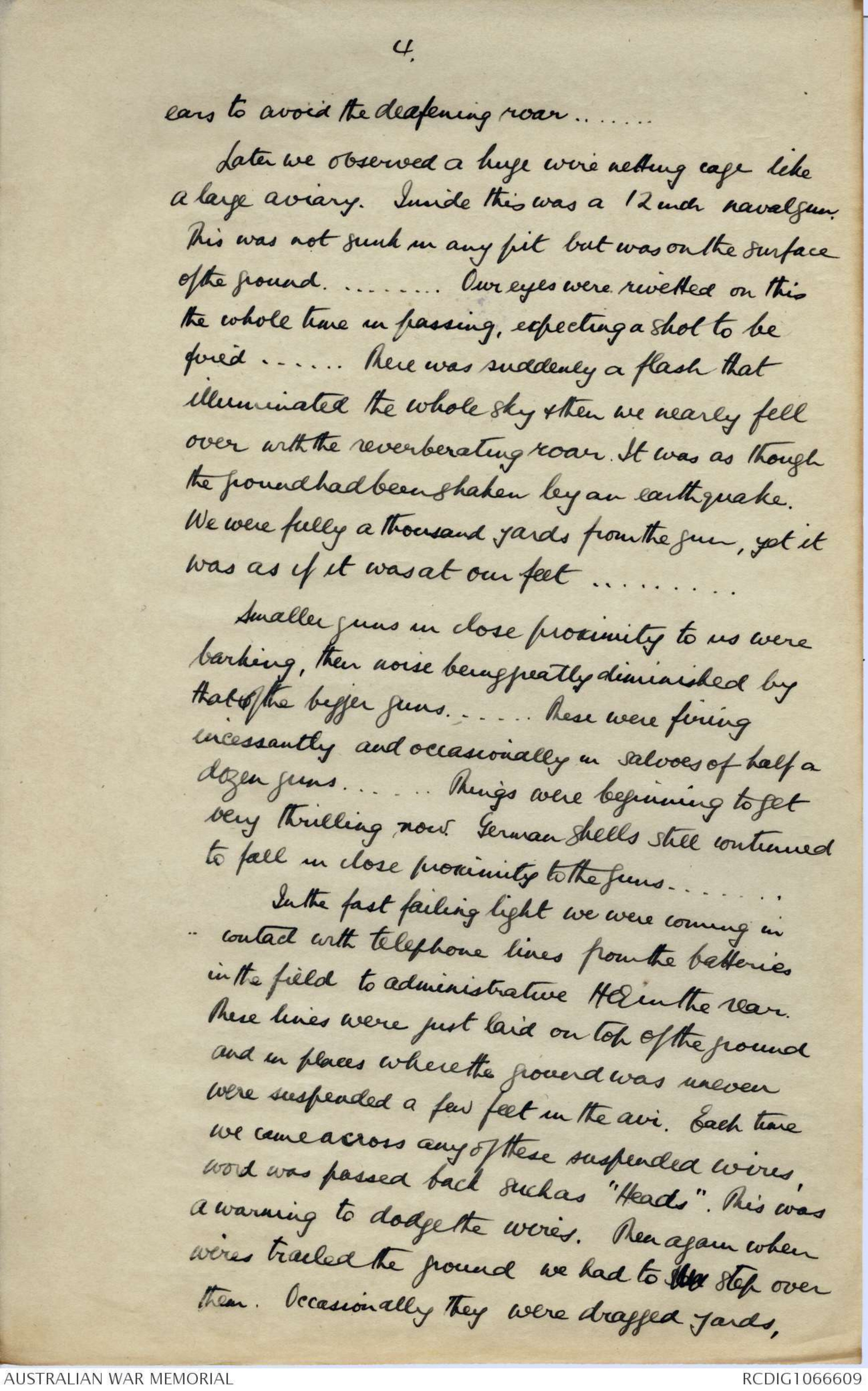
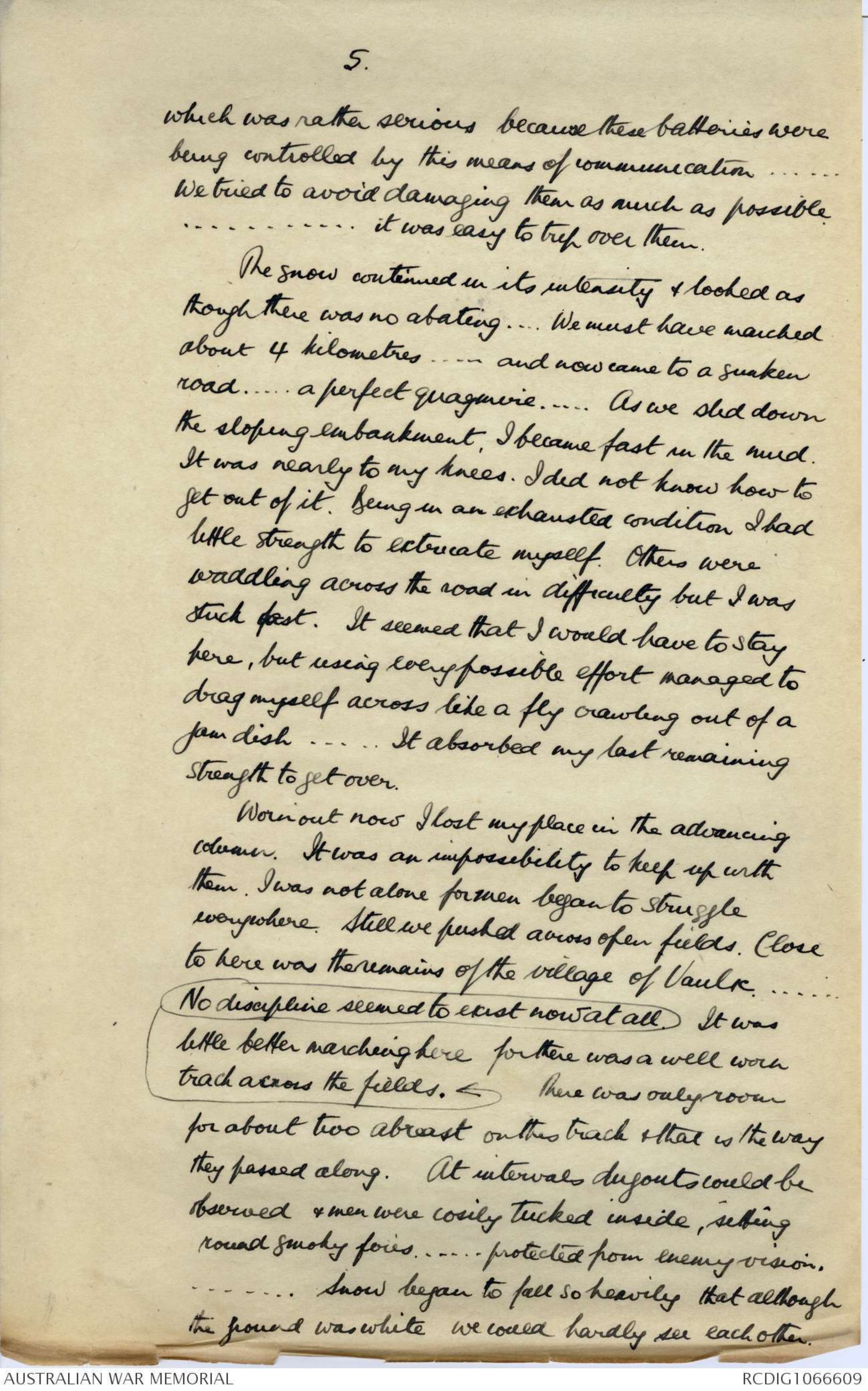
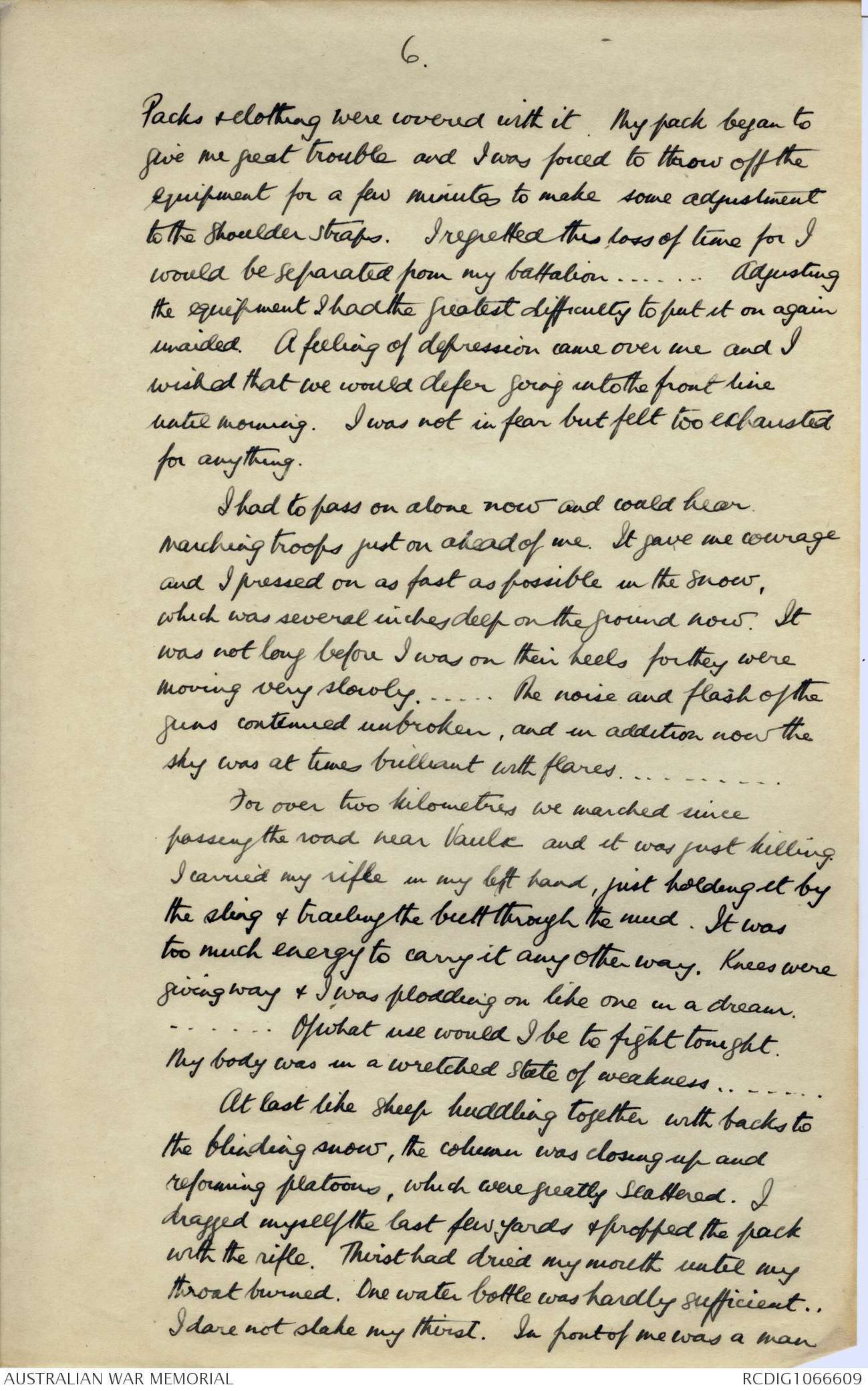
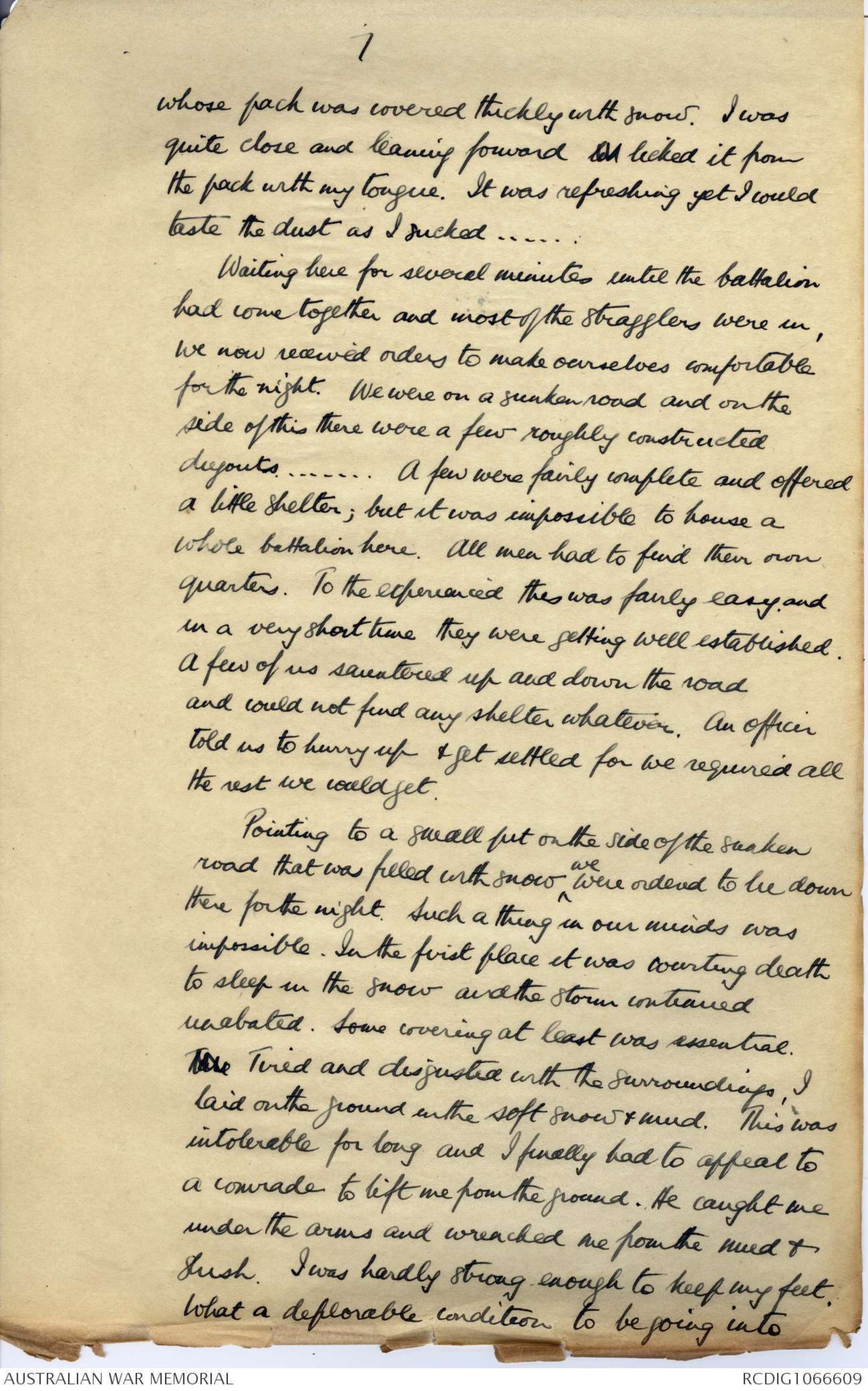
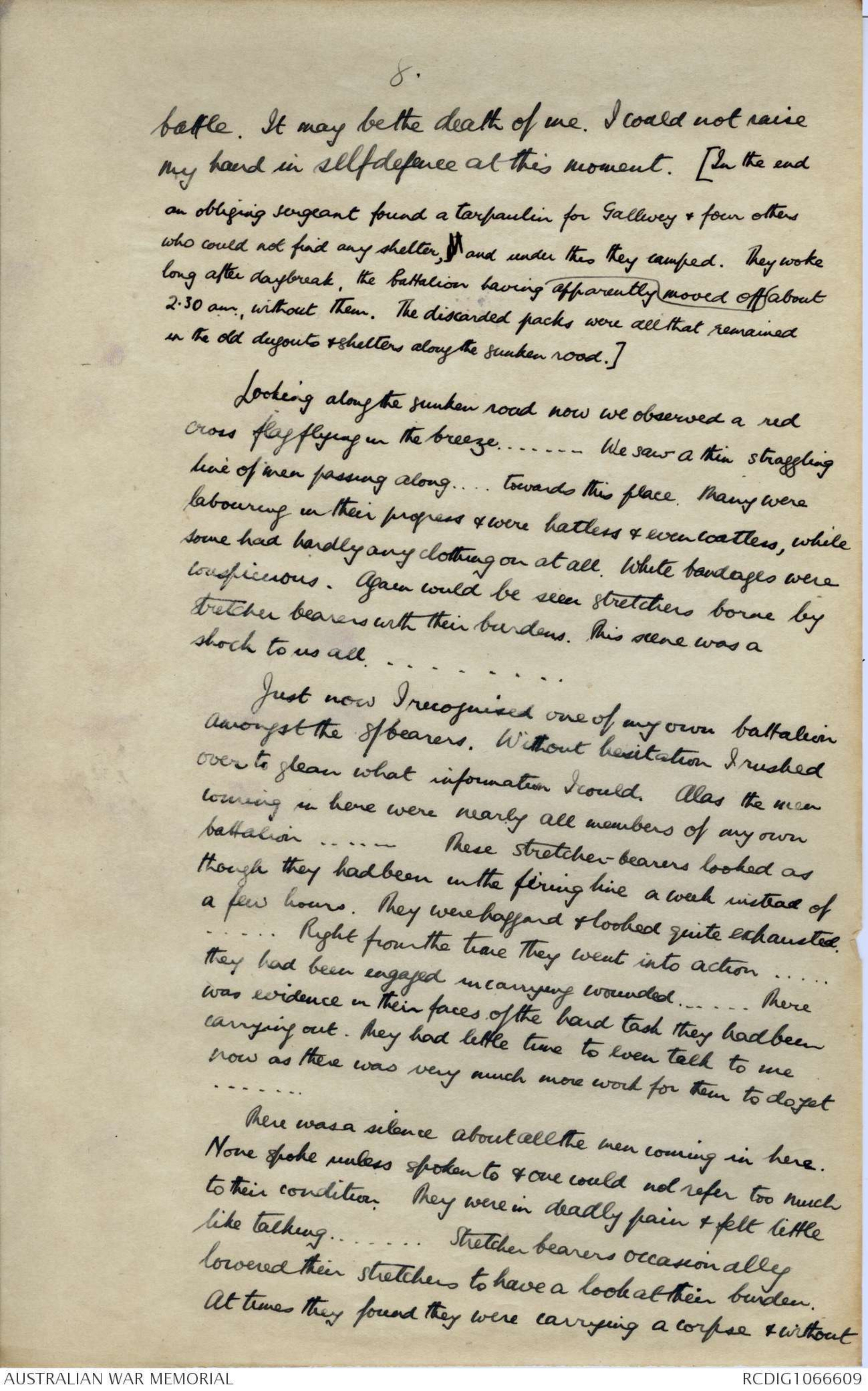
give the exact spot for it
is difficult to judge from
a small map. The trench
system & wire were very
extensive at this point but
about 50 yards to the N.E there
was the road from Riencourt
to Queant and the line
of bodies roughly crossed it
at an angle of 30o.
Trusting this information
will be of use to you, and
wishing your book every success
I am,
Yours very truly
PE Bewshea
Diagram - see original document
Bullecourt
Extracts from the diary of Pte W.D. Gallwey,
47th Battation A.l.F.
[Pte Gallwey, a youngster who enlisted in the AIF in 1916, had
recently arrived in France from Salisbury Plain & joined his
battalion.]
The Australian troops have been selected to storm
Bullecourt . . . . flanking these will be British troops
from selected regiments & from whom much may be
expected. The time of attack has not been made known
to us as is usual with such battles; but it seems
fairly certain that it will only be a matter of hours.
. . . . . We are in complete ignorance of the part we
have to take.
It is only a few minutes since we received
final orders that we were to proceed to the firing line
immediately. The greatest excitement prevailed since
such orders were issued. It would be hard to
describe our feelings. Little preparation was
required as we were all more or less in instant
readiness to depart . . . .
Every man is now busy getting equipment on
for the final route march which cannot be too far.
All are talking & discussing future events. That
their minds are fully cognisant of the hard times
ahead is evident. We reinforcements are ignorant
of it all but the older soldiers are a study. All
are eager & I have not seen fear amongst them.
Like going to some great entertainment, they could
not be more enthusiastic.
2.
Iron rations were immediately issued . . . . . Water
bottles were filled. The parade fell in in quick time &
silently headed for the firing line. Not a word passed
now as we left the old dugouts behind but soon all
commenced whistling & singing soldier songs. There was
merriment everywhere. Officers cast aside the iron
discipline of the parade ground and now behaved
as men of the rank & file. They were in ordinary attire
. . . . Passing through the village of Bihucourt,
comrades gave us a cheer & wished us good luck.
The spirit of camaraderie was excellent.
For about a kilometre we trudged along the
road and then abruptly turned off passing over
ploughed fields. This latter was the worst
marching we had ever experienced. It is not ashard bad on a hard metalled road under a heavy
load but to be on soft ploughed ground, it meant
labour at every xxxx step. We sank deep into
the earth.
It was still daylight. On our left was a
long ridge about 1000 yds away. We could
distinctly see German shells bursting on this
ridge. In the distance also was observed the a
ruined village believed to be Sapignies. There
were loud explosions and puffs of smoke all
along the ridge & over this village. It was a weird
and an awe inspiring spectacle . . . . The noise
began to get deafening as we progressed. So interested
were we in this strange sight that the fatigue of the
march was forgotten.
Soon there was a shrieking wierd noise
3.
that seemed to make direct for us & then there was a
loud explosion a few hundred yds away. A stray
shell had fallen in the field in which we were
crossing. . . . . . This was too close to be pleasant, yet we
laughed at it and there were many funny remarks
as to Fritz's straight shot. . . . . Not one, but many
shells came over with that awful shriek that nearly
froze the blood in our veins. . . . . . All fell
harmlessly in the field at a safe distance. . . . .
Realising the danger we were now ordered to take up
shellfire formation . . . . . We spread ourselves out and
then there was not much danger . . . . .of a whole crowd
being killed together. . . . . Nerves held out well. I did
not feel at all nervous even now and thought if I did
get knocked over it would be just bad luck . . . .
Fatigue was getting us down & we had to halt. The
mud was over the ankles & progress was slow. It was
hard to withdraw the foot after each step. Lying down was
impossible so we just had to stand with the rifle supporting
the pack. . . . .
Our halt was of momentary duration only but
sufficient to give great relief. Snow commenced to fall
& that was rather an inconvenience. . . . . . Fortunately
we had our overcoats on . . . .
Progressing again we passed some huge guns
in emplacement sunk deep into the ground. They were
some distance off. All along the line at intervals
these were placed and every few minutes there was
a roar that nearly broke the drums of our ears
. . . . It was getting very dark now & without
warning we could see vivid flashes of red flame
shoot into the air . . . . We stuck our fingers into our
4.
ears to avoid the deafening roar . . . .
Later we observed a huge wire netting cage like
a large aviary. Inside this was a 12 inch naval gun.
This was not sunk in any pit but was on the surface
of the ground. . . . . Our eyes were rivetted on this
the whole time in passing, expecting a shot to be
fired . . . . There was suddenly a flash that
illuminated the whole sky & then we nearly fell
over with the reverberating roar. It was as though
the ground had been shaken by an earthquake.
We were fully a thousand yards from the gun, yet it
was as if it was at our feet . . . . .
Smaller guns in close proximity to us were
barking, their noise being greatly diminished by
that of the bigger guns . . . . these were firing
incessantly and occasionally in salvoes of half a
dozen guns . . . . Things were beginning to get
very thrilling now. German shells still continued
to fall in close proximity to the guns . . . . .
In the fast failing light we were coming in
contact with telephone lines from the batteries
in the field to administrative HQ in the rear.
These lines were just laid on top of the ground
and in places where the ground was uneven
were suspended a few feet in the air. Each time
we came across any of these suspended wires,
word was passed back such as "Heads". This was
a warning to dodge the wires. Then again when
wires trailed the ground we had to xxx step over
them. Occasionally they were dragged yards,
5.
which was rather serious because these batteries were
being controlled by this means of communication . . . .
We tried to avoid damaging them as much as possible
. . . . it was easy to trip over them.
The snow continued in its intensity & looked as
though there was no abating . . . . We must have marched
about 4 kilometres . . . and now came to a sunken
road . . . . a perfect quagmire. . . . . As we slid down
the sloping embankment, I became fast in the mud.
It was nearly to my knees. I did not know how to
get out of it. Being in an exhausted condition I had
little strength to extricate myself. Others were
waddling across the road in difficulty but I was
stuck fast. It seemed that I would have to stay
here, but using every possible effort managed to
drag myself across like a fly crawling out of a
jam dish. . . . . It absorbed my last remaining
strength to get over.
Worn out now I lost my place in the advancing
column. It was an impossibility to keep up with
them. I was not alone for men began to struggle
everywhere. Still we pushed across open fields. Close
to here was the remains of the village of Vaulx . . . .
No discipline seemed to exist now at all ↓ It was
little better marching here for there was a well worn
track across the fields.← There was only room
for about two abreast on this track & that is the way
they passed along. At intervals dugouts could be
observed & men were cosily tucked inside, sitting
round smoky fires . . . . protected from enemy vision.
. . . . Snow began to fall so heavily that although
the ground was white we could hardly see each other.
6.
Packs & clothing were covered with it. My pack began to
give me great trouble and I was forced to throw off the
equipment for a few minutes to make some adjustment
to the shoulder straps. I regretted this loss of time for I
would be separated from my battalion . . . . Adjusting
the equipment I had the greatest difficulty to put it on again
unaided. A feeling of depression came over me and I
wished that we would defer going into the front line
until morning. I was not in fear but felt too exhausted
for anything.
I had to pass on alone now and could hear.
marching troops just on ahead of me. It gave me courage
and I pressed on as fast as possible in the snow,
which was several inches deep on the ground now. It
was not long before I was on their heels for they were
moving very slowly . . . . The noise and flash of the
guns continued unbroken, and in addition now the
sky was at times brilliant with flares . . . . .
For over two kilometres we marched since
passing the road near Vaulx and it was just killing.
I carried my rifle in my left hand, just holding it by
the sling & trailing the butt through the mud. It was
too much energy to carry it any other way. Knees were
giving way & I was plodding on like one in a dream.
. . . . Of what use would I be to fight tonight.
My body was in a wretched state of weakness . . . .
At last like sheep huddling together with backs to
the blinding snow, the column was closing up and
reforming platoons, which were greatly scattered. I
dragged myself the last few yards & propped the pack
with the rifle. Thirst had dried my mouth until my
throat burned. One water bottle was hardly sufficient . .
I dare not slake my thirst. In front of me was a man
7
whose pack was covered thickly with snow. I was
quite close and leaning forward xxx licked it from
the pack with my tongue. It was refreshing yet I could
taste the dust as I sucked . . . . .
Waiting here for several minutes until the battalion
had come together and most of the stragglers were in,
we now received orders to make ourselves comfortable
for the night. We were on a sunken road and on the
side of this there were a few roughly constructed
dugouts . . . . . A few were fairly complete and offered
a little shelter; but it was impossible to house a
whole battalion here. All men had to find their own
quarters. To the experienced this was fairly easy and
in a very short time they were getting well established.
A few of us sauntered up and down the road
and could not find any shelter whatever. An officer
told us to hurry up & get settled for we required all
the rest we could get.
Pointing to a small pit on the side of the sunken
road that was filled with snow ^we were ordered to lie down
there for the night. Such a thing in our minds was
impossible. In the first place it was courting death
to sleep in the snow and the storm continued
unabated. Some covering at least was essential.xxx Tired and disgusted with the surroundings, I
laid on the ground in the soft snow & mud. This was
intolerable for long and I finally had to appeal to
a comrade to lift me from the ground. He caught me
under the arms and wrenched me from the mud &
slush. I was hardly strong enough to keep my feet.
What a deplorable condition to be going into
8.
battle. It may be the death of me. I could not raise
my hand in self-defence at this moment. [In the end
an obliging sergeant found a tarpaulin for Gallwey & four others
who could not find any shelter, xx and under this they camped. They woke
long after daybreak, the battalion having apparently moved off about
2.30 a.m., without them. The discarded packs were all that remained
in the old dugouts & shelters along the sunken road.]
Looking along the sunken road now we observed a red
cross flag flying in the breeze . . . . We saw a thin straggling
line of men passing along . . . . towards this place. Many were
labouring in their progress & were hatless & even coatless, while
some had hardly any clothing on at all. White bandages were
conspicuous. Again could be seen stretchers borne by
stretcher bearers with their burdens. This scene was a
shock to us all. . . .
Just now I recognised one of my own battalion
Amongst the s/bearers. Without hesitation I rushed
over to glean what information I could. Alas the men
coming in here were nearly all members of my own
battalion . . . . These stretcher-bearers looked as
though they had been in the firing line a week instead of
a few hours. They were haggard & looked quite exhausted.
. . . . Right from the time they went into action . . . .
they had been engaged in carrying wounded . . . . there
was evidence in their faces of the hard task they had been
carrying out. They had little time to even talk to me
now as there was very much more work for them to do yet
. . . .
There was a silence about all the men coming in here.
None spoke unless spoken to & one could not refer too much
to their condition. They were in deadly pain & felt little
like talking . . . . . . Stretcher bearers occasionally
lowered their stretchers to have a look at their burden.
At times they found they were carrying a corpse & without
 Deb Parkinson
Deb ParkinsonThis transcription item is now locked to you for editing. To release the lock either Save your changes or Cancel.
This lock will be automatically released after 60 minutes of inactivity.